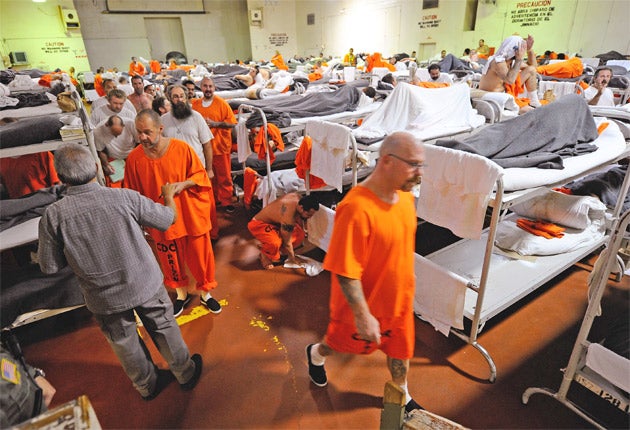The state of California, which built Alcatraz and Folsom State Prison, where Johnny Cash famously sang the blues, has allowed its jails to become so overcrowded that they're causing "needless suffering and death", the US Supreme Court has ruled, saying that 30,000 inmates must be released to make them fit for human habitation.
By a 5-4 majority, the nation's highest court reached the decision after justices were shown photographs of men held in battery-hen-style cages, mentally ill inmates left in pools of their own urine until they were "nearly catatonic", and cancer patients in severe pain dying in their cells without seeing a doctor.
At present California keeps 143,000 inmates in 33 prisons which were originally designed to hold just 80,000, resulting in a suicide rate that is twice the national average. In some cases, 54 men share a single toilet, and up to 200 sleep on bunk-beds crammed into gymnasiums, in conditions inspectors have dubbed "appalling" and "inhumane".
The Supreme Court ruling upholds a string of decisions by lower courts. It gives California two years to reduce its prison population to 110,000.
To achieve that, the State can either release 30,000 convicted criminals early, move them to private out-of-state penitentiaries, or house more people in the county jail system. The first option is political dynamite; the second two will cost hundreds of millions of dollars which its bankrupt legislature does not have.
The ruling, announced on Monday, nonetheless gives California's Governor Jerry Brown a fortnight to submit binding plans for achieving the reduction. "A prison that deprives prisoners of basic sustenance, including adequate medical care, is incompatible with the concept of human dignity and has no place in civilised society," it reads.
In a sternly worded majority argument, the usually conservative Supreme Court added that roughly three quarters of the 40-odd suicides in the state's jails each year are "probably foreseeable or preventable" because they involve "some measure of inadequate assessment, treatment or intervention".
Justice Anthony Kennedy, who wrote the judgment, concluded that overcrowding is the "primary cause" of "severe and unlawful mistreatment of prisoners through grossly inadequate provision of medical and mental health care", leading to "needless suffering and death".
The fact that one of America's most prosperous states should find its criminal justice system likened to that of a banana republic is particularly galling, since just a few decades ago it was the envy of the world. When Cash played at Folsom in 1968, California's rehabilitation programmes had produced the lowest reoffending rates in the country.
Its troubles stretch back to the 1990s, when a string of "tough on crime" measures were passed, dramatically increasing the number of criminals sent to prison. Most notorious was 1994's "three strikes and you're out", which meant a person convicted of a third offence would be jailed for life, even for a petty crime.
The hawkish backers of the new laws were unwilling to raise spending to help cope with the spiralling prison population. To save money, rehabilitation programmes were scaled back, a move that over time meant that reoffending rates increased to their current 75 per cent.
Efforts to end the cycle of overcrowding by reforming either the prison system or sentencing guidelines have foundered, since California prison guards' association, one of the state's most powerful organisations, is vehemently opposed to any measure that reduces the number of jobs available to its highly paid members.
The resulting sardine-like conditions have contributed to dozens of riots (including two serious incidents in the last week). In 2006, a federal judge declared that overcrowding was killing one inmate a week.
Since then, the prison population has been massaged down slightly, and two-thirds of the 20,000 prisoners who were being kept in temporary accommodation have moved from their makeshift beds.
Governor Brown now hopes to persuade state politicians to finance a plan which will further reduce the overall population to 110,000 by making more use of county jails and private facilities. He has assured voters that not a single inmate will be prematurely freed.
In a country that jails a higher percentage of its population than any developed nation, that claim has met with some scepticism. Not least from the four conservative justices who voted against this week's decision.
One of them, Associate Justice Samuel Alito, accused colleagues of "gambling with the safety of the people of California", saying: "I fear that today's decision will lead to a grim roster of victims."
Another, Associate Justice Antonin Scalia, said it was "perhaps the most radical injunction issued by a court in our nation's history", and concluded that "terrible things are sure to happen as a consequence of this outrageous order".
Subscribe to Independent Premium to bookmark this article
Want to bookmark your favourite articles and stories to read or reference later? Start your Independent Premium subscription today.


Join our commenting forum
Join thought-provoking conversations, follow other Independent readers and see their replies